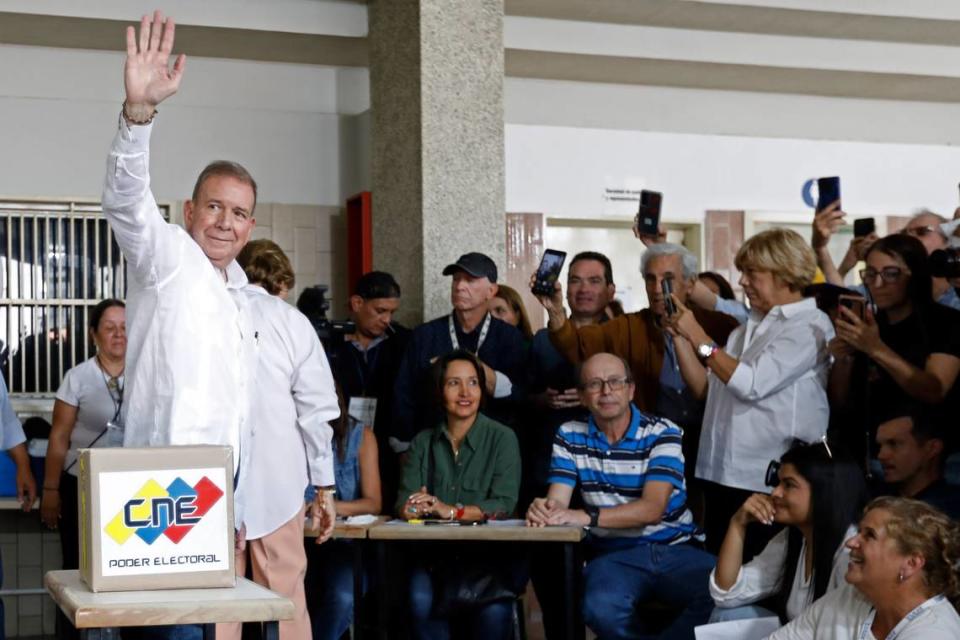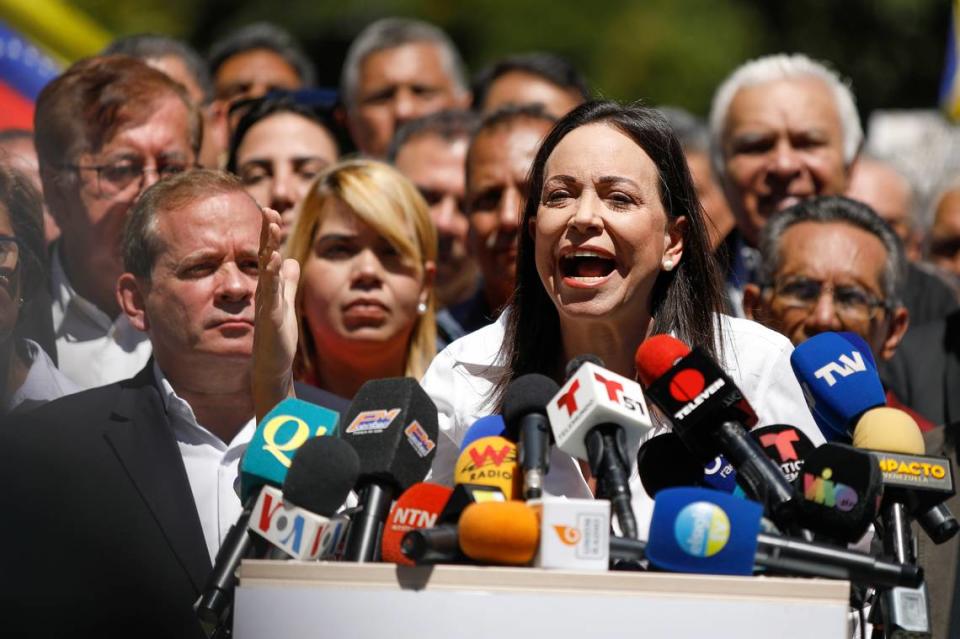Amid overwhelming desire for change, Venezuelans turn out to vote for president Sunday
- Oops!Something went wrong.Please try again later.
- Oops!Something went wrong.Please try again later.
Venezuelans turned out in massive numbers to vote Sunday in a pivotal presidential election seen as the biggest challenge faced by Caracas’ autocratic regime in more than two decades, in a process that appeared to proceed calmly and orderly despite the highly charged environment surrounding the polling.
Expecting to face long lines to vote, many Venezuelans slept outside polling stations, but for the most part people were able to vote fairly quickly Sunday despite fears from opposition leaders that regime officials would attempt to delay the process to discourage voters.
Opposition leaders said by mid afternoon that Venezuelans were voting in “record levels” despite the regime’s intense intimidation campaign. “If it continues like this, it will probably be a record turnout,” opposition leader Maria Corina Machado told reporters.
While official results are not expected to be announced until late Sunday or early Monday, exit polls showed that opposition candidate Edmundo Gonzalez was resoundingly ahead of socialist strongman Nicolás Maduro, who aims to extend the so-called Bolivarian revolution into its third decade.
Early afternoon numbers released by polling firm Meganalisis had Gonzalez ahead with 65%, with Maduro obtaining only 13%, and another 20% declining to answer. Opposition sources told the Miami Herald that other reputable firms had Maduro gathering around 30% of the vote and Gonzalez over 60%.
If confirmed, the election results will put an end to close to 25 years of socialist rule in Venezuela, with Maduro holding the presidency during the last 11. González, however, would only be able to assume the presidency in January, which gives members of the socialist regime a lengthy period to prepare for their exit from power.
González, 74, is a former Venezuelan diplomat who was virtually unknown in the country until he was suddenly endorsed by Machado, who had won the opposition’s primary with more than 92% of the vote before her candidacy was banned by the regime.
Machado and the country’s main opposition political parties publicly united in their support for González and she remains the main force behind the opposition’s campaign.

Given the governments history of committing fraud during elections, opposition leaders have been banking on being able to generate a tidal wave of anti-Maduro votes to overcome any governmental attempts to steal the election. The restricted presence of international observers and Maduro’s iron grip on the National Electoral Council, which oversees elections, have raised questions about Venezuela’s ability to hold free, fair and transparent elections.
In 2019, the U.S. led a group of 50 nations disavowing Maduro’s presidency after concluding that he had stolen the vote the year before. This year’s election came about after a Washington-led pact that required Caracas to launch a comprehensive overhaul of the nation’s electoral system. But Maduro later reneged on the deal, making it difficult for the opposition to keep the electoral council honest.
Voting early on Sunday, Maduro told reporters that he will respect the will of the voters and the results announced by election officials.
Here are the key things to know about Sunday’s presidential election in Venezuela
“I recognize and will recognize the referee, the official bulletins, and I will ensure that they are respected. The word of election officials will be the sacred pronouncements and I call on all 10 presidential candidates, the 38 political parties, to publicly declare that they will respect the official bulletin,” he told reporters.
Days prior to the election, Maduro had called on all of his rivals, including Gonzalez, to agree to recognize the final pronouncement of the results by the electoral council, but opposition leaders have said they would only recognize the authority’s pronouncements if they match the voting records they will be gathering throughout the election.
Most polls had Gonzalez winning comfortably with more than 60% of the votes and Maduro getting between 15% and 25%.
Gonzalez, who voted around noon, said he was hopeful that the country’s armed forces will ensure that the will of the people will be respected, but said that opposition leaders have built a network with members present at each voting station that will protect their votes.

“We are prepared to defend every single vote cast. The defense of the vote will be done rigorously. We have witnesses in each and every one of the voting tables,” he said
More than 21 million Venezuelans are registered to vote, but millions of them won’t be able to participate because they are outside the country. More than 7.7 million Venezuelans have fled to other countries in recent years to escape the harsh living conditions at home. None of the estimated 800,000 Venezuelans living in the United States will be able to vote unless they traveled back to their home country.
Polls opened at 6 am and close at 6 p.m. Results are expected to be announced no earlier than the early morning hours Monday and perhaps later.
While not allowed to participate in the election, members of the Venezuelan community in Miami were keeping watch on the events in Venezuela. At a gathering organized on Brickell Avenue to support the vote, Venezuelan born Doral City Council member Rafael Pineyro said that it was an emotional day.
“I am Venezuelan, my wife is Venezuelan. Like everyone here, we were forced to leave the country,” Pineyro said, expressing his hopes the election will lead to a political change in the South American country.
“Today we put an end to a regime that has humiliated us, arrested thousands of people, killed, staged drug trafficking shows, exiled us, and separated families,” Pineyro said. “Today we put an end to all of this, and we welcome the Venezuela we all dream of.”
El Nuevo Herald reporters Sonia Osorio and Verónica Egui Brito contributed to this story.

